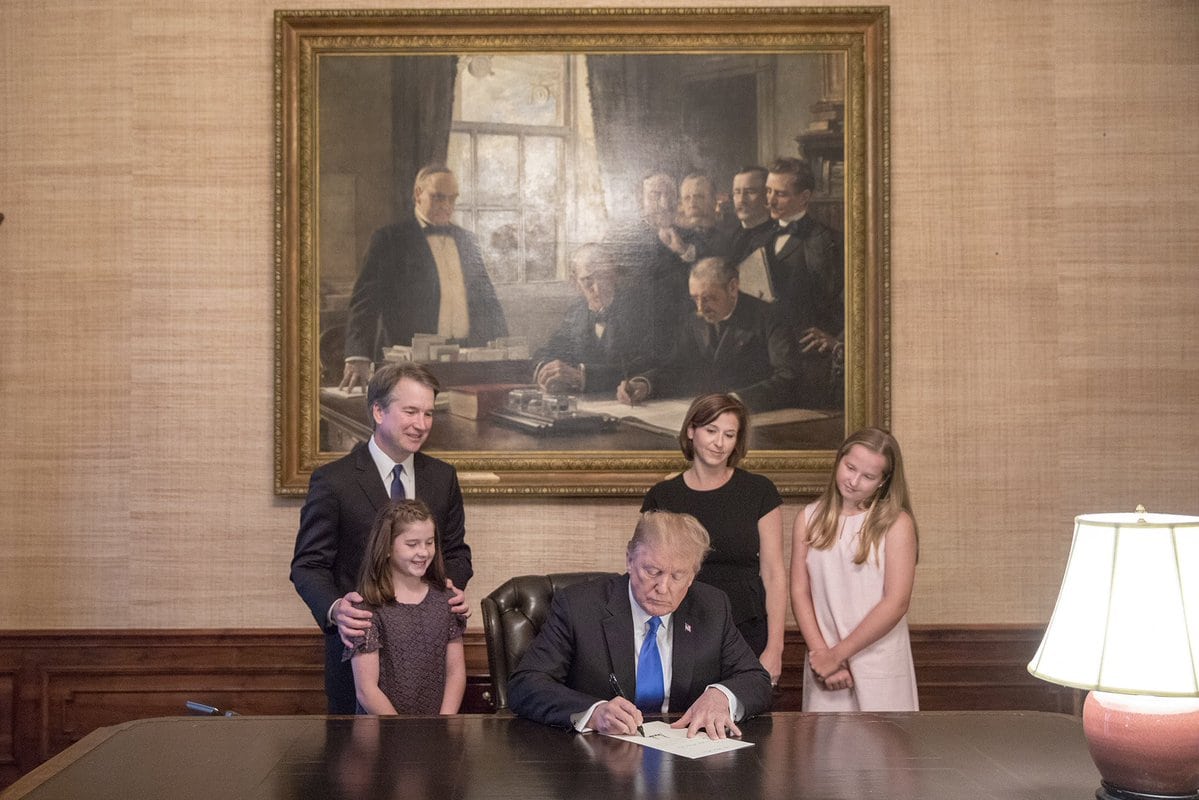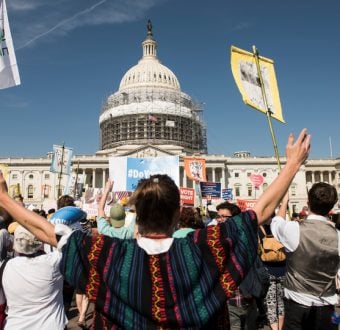Brett Kavanaugh’s confirmation to the Supreme Court would solidify an extremist Supreme Court that places corporate interests before people’s interests for at least a generation. Replacing Justice Kennedy’s crucial swing vote could destroy dozens of essential public policy safeguards, and undermine cherished constitutional protections. Whether it’s basic privacy, reproductive rights, or fundamental environmental protections, every hard-won protection social justice movements have achieved over the past half-century is at risk if Kavanaugh makes it to the bench.
For example, Kavanaugh’s concurrence in Klayman v. Obama legitimized the NSA’s warrantless collection of data, writing, “[T]he Government’s metadata collection program is entirely consistent with the Fourth Amendment.” Also concerning is the Mueller investigation. Kavanaugh urged Congress in a 2009 law review article to “consider a law exempting a president—while in office—from criminal prosecution and investigation, including from questioning by criminal prosecutors or defense counsel.” Might Trump’s nomination of Kavanaugh be an effort to escape criminal liability for illegal conduct?
Perhaps the most talked about decision that Kavanaugh could help overturn is Roe v. Wade—the 1973 decision enshrining a pregnant person’s right to access abortion services. Should Roe be reversed, only eight states would have constitutional protections upholding choice. With the Court solidly in the hands of conservatives, the erosion of reproductive rights would endanger many other public-health protections achieved over the past several decades—by challenging the right to privacy itself.

Brett Kavanaugh’s confirmation to the Supreme Court would solidify an extremist Supreme Court that places corporate interests before people’s interests for at least a generation.
The right to privacy is not just the bedrock for a constitutional right to choice, it’s also the basis for Romer v. Evans, a 1996 ruling against a Colorado constitutional amendment denying equal protection to lesbians and gay men. Romer formed the basis for subsequent cases such as Lawrence v. Texas—striking down anti-sodomy laws, U.S. v. Windsor—striking down the Defense Of Marriage Act, and Obergefell v. Hodges—guaranteeing marriage equality. Justice Kennedy authored all four cases. Overturning Roe jeopardizes all of these hard-fought gains. (Note, despite their endangered status, these are all limited victories and today most of the queer and trans community remains largely unprotected by law.)
Gutting the Affordable Care Act is another danger. In Kavanaugh’s concurrence in 2015’s Seven-Sky v. Holder, he wrote, “[t]he President may decline to enforce a statute that regulates private individuals when the President deems the statute unconstitutional, even if a court has held [sic] the statute constitutional.” In other words, past precedent be damned the President is empowered to deny equal treatment to even the most vulnerable.
This brings us to the world’s greatest public health threat—the climate crisis. Kavanaugh’s record on the environment is, at best, deeply troubling. Unlike President Trump, Kavanaugh will admit the planet is warming, but as explained by the aptly named environmental law professor Bill Snape, “He is pretty consistently anti-environment on every front… I call him Lord Voldemort.”
Kavanaugh’s opinions consistently seek to limit the power of administrative agencies. The landmark 1984 ruling Chevron v. NRDC held that courts should provide deference to an administrative agency’s actions, as long as the actions are reasonable. While Kavanaugh may admit climate change is real, he is loathe to encourage the sharpest tool our government has available—the EPA—to actually combat it. Instead, he urges Congress to enact legislation, knowing Congress has already delegated such legislative powers to the Executive branch. Congress has not passed significant environmental protections since amending the Clean Air Act in 1990.
Furthermore, the Court may confront Chevron deference head-on in the next couple of years. Two significant cases issued last term have the power to completely reshift decades of agency practice and policy. The first, Epic Systems Corporation v. Lewis, examined what to do when two administrative agencies reach differing results—to which agency does the court defer? Buried in the Gorsuch-authored opinion appears this sentence: “No party to these cases has asked us to reconsider Chevron deference.” Some speculate this shows a Court eager to embrace such a radical shift.
In another critical case this term, Janus v. AFSCME, the Court questioned stare decisis itself. (Stare decisis is the judicial principle whereby courts issue rulings according to what previous courts have decided, i.e., precedent.) Alito’s opinion rejected a long-established case, one on which dozens of other cases—among other ways of crafting public policy—had been built. Most importantly, Alito’s reasoning departed from past decisions on stare decisis; now overturning prior precedents is substantially easier. A new justice will be emboldened to take the mantel even further to the right. Of course, none of this is to discuss the merits of these two cases at all, both of which gutted labor unions.

When it comes to the world’s greatest public health threat—the climate crisis—Kavanaugh’s record on the environment is, at best, deeply troubling.
Kavanaugh would find unity with Chief Justice Roberts’ well-documented pro-business stance. Kavanaugh’s twelve years as an appellate judge produced a bevy of business-friendly decisions, often at the expense of environmental causes. Indeed, after announcing Kavanaugh’s nomination, the White House circulated a document touting this portion of Kavanaugh’s record.
Put together, with significant First Amendment issues at the fore (such as corporate speech), EPA regulations losing Chevron protection, and a weakening of stare decisis means we can expect to see many more pro-corporate rulings in the environmental area.
Perhaps the starkest example of Kavanaugh’s danger to the environment is illustrated by his view of a crucial 2007 decision Massachusetts v. EPA, where George W. Bush’s EPA was sued to force greenhouse gas regulation; Kennedy cast the deciding vote in favor of regulation. Kavanaugh’s track record in similar policy battles cuts against that critical decision, and should a case tee-up giving him the opportunity, the EPA’s power may be limited even further.
And this is to say nothing of Kavanaugh’s record on voting rights, immigration, campaign finance, the Consumer Protection Bureau, net neutrality, and a host of other issues.
Kavanaugh is an obviously atrocious pick for our communities, our environment, our future. The Supreme Court directly impacts people’s lives, particularly the most vulnerable among us. This is about climate justice, about white supremacy, patriarchy, capitalism, displacement, migration, mass incarceration, imperialism—and what this country does about it. Contact your Senators today and every day until his hearing and demand that they vote no on Brett Kavanaugh’s confirmation.



